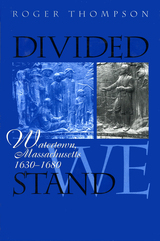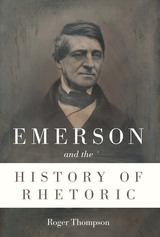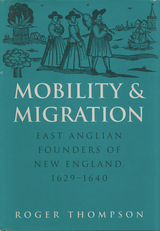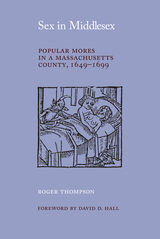4 books about Thompson, Roger

Divided We Stand
Watertown, Massachusetts, 1630-1680
Roger Thompson
University of Massachusetts Press, 2012
Established in 1630, Watertown was among the original six towns of Massachusetts. Its early history was marked by frequent disputes, a penchant for questioning authority, and an atmosphere of tension and discord. In recounting the story of Watertown's formative years, Roger Thompson examines how the community managed to avoid descending into anarchy. He also explores the ways in which English settlers preserved their habits of behavior in a new-world environment, even as they were obliged to innovate and embrace change.
Thompson describes Watertown's early government, its relations with Native Americans and neighboring communities, its religious and economic affairs, and the day-to-day experiences of its people. Conflict occurred over a wide variety of issues: land allocation, administrative accountability, religious orthodoxy and exclusivity, generational and gender differences, livestock and fencing, haves and have-nots.
Thompson brings these disputes to life through a series of vivid case studies drawn from the unpublished Middlesex County Court Records. Among others, we meet John Sawin, who despite his best efforts at subterfuge was convicted of stealing and selling a neighbor's horse; Susanna Woodward, whose pregnancy resulted in a fiercely contested paternity case; and Edward Sanders, whose punishment for child abuse was both a whipping and a ruling that when in public he must "wear a rope round his neck openly to be seen hanging down two feet."
Throughout the book, the same themes reappear: continuity and change, the persistent conflicts of the first two generations, and the countervailing forces of communal cohesion.
Thompson describes Watertown's early government, its relations with Native Americans and neighboring communities, its religious and economic affairs, and the day-to-day experiences of its people. Conflict occurred over a wide variety of issues: land allocation, administrative accountability, religious orthodoxy and exclusivity, generational and gender differences, livestock and fencing, haves and have-nots.
Thompson brings these disputes to life through a series of vivid case studies drawn from the unpublished Middlesex County Court Records. Among others, we meet John Sawin, who despite his best efforts at subterfuge was convicted of stealing and selling a neighbor's horse; Susanna Woodward, whose pregnancy resulted in a fiercely contested paternity case; and Edward Sanders, whose punishment for child abuse was both a whipping and a ruling that when in public he must "wear a rope round his neck openly to be seen hanging down two feet."
Throughout the book, the same themes reappear: continuity and change, the persistent conflicts of the first two generations, and the countervailing forces of communal cohesion.
[more]

Emerson and the History of Rhetoric
Roger Thompson
Southern Illinois University Press, 2017
Much has been written about Ralph Waldo Emerson’s fundamental contributions to American literature and culture as an essayist, philosopher, lecturer, and poet. But despite wide agreement among literary and rhetorical scholars on the need for further study of Emerson as a rhetorical theorist, little has been published on the subject. This book fills that gap, reenvisioning Emerson’s work through his significant engagement with rhetorical theory in the course of his career and providing a more profound understanding of Emerson’s influence on American ideology.
Moving beyond dominant literary critical thinking, Thompson argues that for Emerson, rhetoric was both imaginative and nonsystematic. This book covers the influences of rhetoricians from a range of periods on Emerson’s model of rhetoric. Drawing on Emerson’s manuscript notes, journal entries, and some of his rarely discussed essays and lectures as well as his more famous works, the author bridges the divide between literary and rhetorical studies, expanding our understanding of this iconic nineteenth-century man of letters.
Moving beyond dominant literary critical thinking, Thompson argues that for Emerson, rhetoric was both imaginative and nonsystematic. This book covers the influences of rhetoricians from a range of periods on Emerson’s model of rhetoric. Drawing on Emerson’s manuscript notes, journal entries, and some of his rarely discussed essays and lectures as well as his more famous works, the author bridges the divide between literary and rhetorical studies, expanding our understanding of this iconic nineteenth-century man of letters.
[more]

Mobility and Migration
East Anglian Founders of New England, 1629-1640
Roger Thompson
University of Massachusetts Press, 2009
During the 1630s, more than 14,000 people sailed from Britain bound for New England, constituting what has come to be known as the Great Migration. This book offers the most extensive study of these emigrants ever undertaken. Focusing on 2,000 individuals who moved from the five counties of eastern England, it provides historians with important new findings on mobility, family life, kinship networks, and community cohesion." "Roger Thompson reveals the personal experiences and ancestral histories of the emigrants. He follows them across the Atlantic and investigates their lives and achievements in the New World. Distinguising between such groups as gentry, entrepreneurs, artisans, farmers, and servants, he explores whether the migration tended to be a solitary uprooting from a stable and predictable world of familiar neighborhoods or simply a longer move among many relocations." "Thompson also sheds light on the issue of motivation: Were these settlers pulled by the hope of eventual enrichment or of founding a purified society, or were they pushed by intolerance and persecution at home? Did they see New England as a haven of escape or an opportunity to exploit? Did New Englanders seek to replicate "English ways," preserving traditional culture and society, or did they embrace change and innovation? Mobility and Migration provides a wealth of new evidence for historians of both early modern England and colonial America.
[more]

Sex in Middlesex
Popular Mores in a Massachusetts County, 1649-1699
Roger Thompson
University of Massachusetts Press, 1989
"Thompson analyzes the court records of 17th century Middlesex County, searching for such sexually related crimes as fornication, breach of promise, sexual deviancy, and adultery. His findings help shatter the traditional historical caricature of New England Puritans as patriarchal, dour wife-beaters and child-abusers, a myth eloquently created by Perry Miller and most recently reinforced by Lawrence Stone. In the court records Thompson discovers Puritans who exhibited 'tolerance, mutual regard, affection, and prudent common sense' within the context of a popular Puritan piety. A well-written social history that places Puritanism in a human rather than an intellectual framework, Sex in Middlesex is recommended for all students of American history and the American family."—Library Journal
[more]
READERS
Browse our collection.
PUBLISHERS
See BiblioVault's publisher services.
STUDENT SERVICES
Files for college accessibility offices.
UChicago Accessibility Resources
home | accessibility | search | about | contact us
BiblioVault ® 2001 - 2024
The University of Chicago Press









